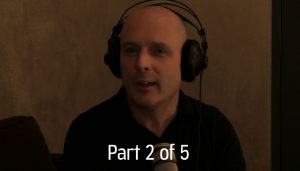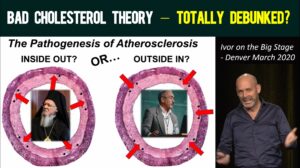Before enjoying this podcast, please help by subscribing for free here: https://thefatemperor.com/subscribe/ and help us to get the message out; it only takes a second – thank you! Also please share as much if possible to help the people!
Now for a short and densely-packed episode with my good friend and insulin/mitochondria genius – Professor Ben Bikman PhD!
His new book has just become available here too – with all the secrets of metabolic control! 🙂 https://www.amazon.com/Why-We-Get-Sick-Disease_and/dp/194883698X
TRANSCRIPT:
Ivor Cummins 00:45 Ben Bikman, great to see you again here in Denver.
Ben Bikman 00:49 Ivor. Good to see you, brother.
Ivor Cummins 00:50 Yeah. And you are the master of insulin, glucagon, mitochondria and so many more things.
Ben Bikman 00:56 Yeah.
Ivor Cummins 00:56 So, I thought today for the people listening we could go through some of your insights from the past couple of years on the white and brown fat insulin’s action, glucagon, and mitochondrial health and how that ties into things, maybe at a high level so that everyone can grasp the importance of this topic.
Ben Bikman 01:16 Yeah. My background is classically focused on insulin. I’m an insulin guy, I guess to sum up in one word, but I also have a great deal of mitochondrial background. The mitochondria are relevant today, because the main things that people are concerned with, well, among many of them, obesity and diabetes, and at their core, those are metabolic disorders. And insofar as the hormone insulin is what drives the metabolic car, insulin is very relevant in this same conversation. What I mean by that is, insulin is what dictates energy use in the body. And so over the last few years, two years in particular, much of the research in my laboratory has focused on how insulin affects the degree to which the mitochondria are using energy. And as most people know, or will remember, the mitochondria are what we often call the powerhouse of the cell, where that is the part within the cell that is responsible for mostly taking in fuel in the form of fat and carbohydrate, and then producing stuff the cell needs. In other words, breaking down energy to give the cell what it needs to do whatever it needs to do.
02:31 Insulin drives that general process where if insulin is really high, it slows down the rate at which the mitochondria are using energy. If insulin is low, it allows the mitochondria to be a little more spendthrifty, or more liberal with how it’s using energy. I submit that matters to the average person who’s struggling with their weight. Because if a person can adhere to a diet that helps keep insulin in control, that will create an overall shift in metabolic function in such a way that the body is now just wasting energy a little more readily than it was before.
03:09 And that gets into what you’d mentioned in the introduction, the differences between white adipose or white fat and brown fat. And briefly, all humans have mostly white fat, most of what we consider body fat is very white in color. If you pulled out a little piece, which we do, you’d see that it’s quite white. In contrast, we all have a little bit of what’s called brown fat. It’s brown because it has so much mitochondria in it. It actually gives it this darker reddish brown color. Not only does the brown fat have more mitochondria, these mitochondria are what we call uncoupled. In other words, they will very readily use energy for no good reason. It’s just burning through energy just to create heat. And so that means someone who has more brown fat or their brown fat is more active has a much higher, a demonstrably higher metabolic rate. And because brown fat mostly uses glucose, then you’re dumping in the glucose and glucose comes down. And again, it helps keep insulin low because as glucose goes generally so well insulin.
04:12 Now, what we found is that even in people, if you can keep insulin low, that would mean not to introduce a new character, but I’ll just mention it, that would mean ketones are going to be higher. But again, maybe I don’t even need to go that far. If insulin is low, what starts to happen is all of the bodies are much of the body’s white fat, which is all the fat that we store subcutaneously or just beneath the skin. So the fact that you can pinch and jiggle. That fat starts to act a little more like brown fat, because the insulin is low. And so it starts to just be more liberal, or as I said, spendthrifty with its energy. And so it will start to use more energy, not for any good reason. And the sum or the end result of that is it’s just wasting energy in the form of heat.
05:01 All together, this helps us understand some of the very real human research that is out there. There have been some extremely well conducted clinical studies that put people on two very tightly controlled diets. And the diets that restrict carbohydrates enough, so lower carbohydrate, more protein and fat and because protein and fat has little to no effect on insulin, by focusing on those parts of the diet, a person who’s adopting that kind of diet, lower in carbohydrates higher in protein and fat, their insulin goes very low. Not dangerously low, but nicely low. These people have higher metabolic rates.
05:42 And again, this is multiple studies at this point in extremely well controlled environments. We can state conclusively confidently, people who adopt a diet that puts their insulin very low have higher metabolic rates. That’s good news. Because one of the tedious ways of living a life is counting every stinking calorie. Nobody wants to do that. But that is the base of the conventional low fat, low calorie diet. You got to cut your calories. You got to exercise to try to get into a caloric deficit. It’s this constant caloric accounting, that it’s just miserable. Nobody enjoys that. But when you know that you have more wiggle room, because insulin is low, you’re burning more calories. And this can be upwards of 300 more calories per day, in a paper recently published, that lets you have that freedom, where you think, “I don’t have to be counting my calories.” The essence of that kind of diet, which is lower carbohydrate, higher protein fat, it is, “Eat when you’re hungry, don’t eat when you’re not,” and no counting of calories required. And that could be partly derived from this fact that your metabolic rate is simply higher.
Ivor Cummins 06:53 Yeah, no, and that’s a fantastic summary Ben, I must say. And it also goes some way towards explaining all those trials for weight loss in the past where the low carb high fat diet ad lib where you’re allowed to eat what you want beat the calorie restricted low fat diet. And that is one of the factors is this energy spend thriftiness down at the mitochondrial level. And another, I guess, in fairness is that the low carb diet by its nature is more, you know, satiating. So there’s another advantage. So just really lots of advantages.
Ben Bikman 07:29 I agree. That’s exactly right. The studies that you’re mentioning, were some of the justification from my lab asking how could we start to tease out the molecular mechanism to explain that very thing. Because so many of the clinical studies available for anyone to read will put people into two diets. Almost always, it’s some form of low fat, low calorie, or low carbohydrate, calorie unrestricted. And these people will lose more weight, sometimes double the fat loss as opposed to the other group that’s counting their calories. And yet, the laws of thermodynamics must be upheld. And the simple reality is that these people are just running a little hotter, so to speak. They’re just burning more. Their engines are a little busier. They’re idling at a higher RPM. And so they’re just able to get through that fuel a little more readily.
08:18 What ends up happening is even though they can eat ad libitum, they don’t. Well they do, but they end up just controlling themselves to a level that’s surprisingly close to the low calorie people. They end up just self regulating. But they’re not denying themselves. They’re eating as much as they want. And yet, they end up just being more satisfied with what they’re eating.
Ivor Cummins 08:43 And the nature of the diet with lots of healthy fats is more nutrient dense. So there are lots of other benefits to a healthy low carb, healthy fats diet that’s really nutrient dense and well formulated.
Ben Bikman 08:55 Agreed.
Ivor Cummins 08:55 Yeah. And obesity, of course is the big thing that everyone’s got some vanity, everyone’s interested in losing weight. I of course worked for the Irish Heart Disease Awareness, ihda.ie and we’re much more focused on finding the people at risk for heart attack who don’t realize it using the calcium scan. But the thing is, the parallels are massive. All of the things you do in a dietary sense, and in everything you described, are all going to contribute hugely to your heart health. And if you have diabetes, or undiagnosed diabetes, you’re thin outside fat inside, there are millions of those people, applying what we’re talking about is going to certainly reverse aspects of your diabetic physiology. So maybe we could talk about that, all of these things, the burning of more glucose, lower insulin, how they tie into lower heart disease risk.
Ben Bikman 09:51 Yeah. So to touch on in particular the obesity diabetes connection, in diabetes, of course, especially being linked to heart disease, most diabetics will die from heart disease. In the end, it’s not the diabetes per se that gets them. But a common core that as I look at these diseases, a common core is insulin resistance. Just saying insulin resistance doesn’t convey the whole story, because the other side of this is the hyperinsulinemia. Those are very, very related but also distinct ideas, where I am unaware of a situation of genuine insulin resistance, a condition where insulin is not working the same way it used to throughout the body. And that’s the most simple way to explain it, I suppose. It is always coupled with hyperinsulinemia. Those two conditions go together. If someone wants to invoke insulin resistance and yet insulin is low, I wouldn’t use the term insulin resistance in that situation. But it has all together and created this perfect pathogenic metabolic storm.
10:57 Or let’s look at for heart disease for example. One of the main predictors of heart disease is hypertension. And insulin resistance causes hypertension through multiple well known distinct mechanisms. It makes the body retain more salt. Some people are salt sensitive, many people are not. When someone needs salt, typically the body will just get rid of it very readily. And so it has minimal impact and no long term impact on blood pressure. However, insulin if it’s too high, which it is with insulin resistance, increases the production of a hormone called aldosterone that wants to retain salt. And so now the kidneys are retaining salt when they shouldn’t, they’re retaining water when they shouldn’t. So blood volume has gone up and as volume goes, so to this pressure. And so that’s a direct mechanism.
11:44 Also, as the blood vessels become resistant to insulin, they lose that ability to dilate. Normally, if we were to infuse insulin into one particular section, one limb of the body, we would detect a noticeable reduction in blood pressure because insulin induces vasodilation very, very well, normally. In the insulin resistant person, that stops happening. And so when insulin comes to those blood vessels trying to increase blood flow, nope, they stay constricted.
12:12 And the hyperinsulinemia also is promoting the growth of the blood vessel wall. And so not only is it not expanding, it’s actually starting to grow narrow, more and more narrow. So there are these and more distinct mechanisms, just directly linking insulin resistance, which is fundamental to Type 2 diabetes, that is Type 2 diabetes is insulin resistance, and obesity is hyperinsulinemia. And so when we bring the two of those together, we now have at least in the case of hypertension, which is kind of the low hanging fruit with heart disease, a direct explanation. And that’s why, mind you, in my experience, not clinical but academic, I see that when people adopt a low carbohydrate diet, one of the first things they have to do is monitor their blood pressure medication. If they’re taking anti hypertensive medications, their blood pressure starts to drop so quickly, so dramatically, that they’re getting lightheaded all the time. And so one of the first things they need to do is wonder whether their dose needs to be changed. And usually the physician, of course, is the one to help them do that.
Ivor Cummins 13:15 Yeah, it actually is one of the flags that shows the power of the low carb diet for heart health and reversing diabetes is blood pressure, which are absolutely correct. Idiopathic or essential hypertension where they don’t know what the cause is, is mostly related to hyperinsulinemic.
Ben Bikman 13:31 Absolutely.
Ivor Cummins 13:33 So when you go on a low carb diet, not only does your insulin drop, your blood pressure drops, your cholesterol ratios improve in the vast majority, your GGT and liver enzymes recover and lower. Your weight drops as well, but that’s a nice side effect.
Ben Bikman 13:48 Yeah. And that should be always viewed as a side effect. Right? I mean unfortunately, like you’d said earlier, because we’re also ego driven, people focus so heavily on just the body fat angle. But that really ought to just be a symptom of a change that’s generally going in the right direction, like you said. So people will be losing weight, yep, that’s good. But know that that means the body’s becoming more insulin sensitive, insulin’s coming down and there are a host of beneficial things happening. Like the liver fat reducing, for example, brain mitochondrial function, we’re doing that kind of research right now. Brain mitochondrial function, the neurons actually start to improve the way they’re working. And as I alluded to earlier, fat cells begin to pick up their metabolic rate. Muscle cells begin to work a little more efficiently, as I talked about in my talk at this conference. But nevertheless, everything gets better.
Ivor Cummins 14:41 And it is. It’s almost sometimes when you describe all the benefits of a low carb diet, people kind of are a bit incredulous and it sounds like too good to be true. But for the overwhelming majority people, and the majority of adult Americans now are now essentially diabetic and a huge risk for heart disease even if they appear slim.
Ben Bikman 14:59 That’s right.
Ivor Cummins 14:59 Because of the hyperinsulinemia insulin resistance kind of milieu is the problem. And they could benefit so massively but people find it hard to believe that we’ve gotten the wrong advice for 50 years from all the experts. It’s a hard thing to accept for people that it was kind of just the wrong advice and now we’ve got to change with designs? [ 00:15:19]
Ben Bikman 15:19 Yeah, yeah. A moment ago, you mentioned how so many people are suffering from these consequences of hyperinsulinemia and insulin resistance, and they won’t link it to that. It’s because I suspect, most people that are hearing this, they’re inclined to hear this conversation in the context of diabetes. And when people think diabetes, they think glucose or blood sugar. But the great tragedy, of course, is that because of our obsession on looking at diabetes as a glucose disease, this glucose centric paradigm, we’ve ignored what you and I would both consider to be the more relevant variable which is insulin. What’s been happening behind the scenes in this person’s body is that over the years due to their diet, their insulin is coming up and up and up and up and up. So hyperinsulinemia and insulin resistance.
16:08 But, because we don’t look at the insulin, this is going unnoticed. All they notice is they’re gaining weight, their blood pressure is starting to climb, they have dyslipidemia, all of these consequences of insulin resistance. And they look at them all is very distinct disorders, little knowing that they do have a common core, which is very liberating to know. But nevertheless, they’re becoming increasingly insulin resistant. And then because one of insulin’s main actions is to keep blood glucose in check, eventually that becomes affected. And so we get to the point where they basically can’t make any more insulin. They’re so resistant to their own insulin, however, at this point, that even though they’re swimming in a sea of insulin, now the glucose starts to climb. And it’s only then potentially 10 years after the insulin is spiked, if not more, that we finally, based on conventional clinical diagnostics, detect the problem. When the physician says, “Ah, your glucose is now up,” “Well, then you have diabetes or even pre diabetes.” But the great tragedy, of course, is that if we were looking at this through the lens of insulin, we could detect the problem far earlier. And then rather than put this person on interventions to try to bump the insulin even higher, driving all of these insulin dependent pathologies like hypertension and weight gain and fatty liver disease, we end up making the disease worse.
17:28 So, the conventional medicine will just say, “All right, we just need to lower the glucose. Who cares what the insulin is doing. So let’s just bump the insulin up even higher, give you insulin or give you drugs to increase your insulin production, and it will help push the glucose back down.” Of course, the great tragedy of that paradigm is while conventional medicine is trying to just push the glucose down or push it out of the body, the flip side of this is it just put less glucose into the body. If this is a body that cannot handle glucose very well, then quit trying to push it out. Just put less in. It’s such an intuitive paradigm. So those of us on this side of the table who look at it this way, we kind of want to just scream to the world because what we’re looking at, we believe is so rational and so intuitive that, well frankly, we want everyone to know about it.
Ivor Cummins 18:16 And the sooner everyone knows about it, I agree totally. There are countless undiagnosed diabetics who have gone to the grave at heart attacks who never even knew they had diabetes.
Ben Bikman 18:25 That’s right.
Ivor Cummins 18:25 Probably more than diagnosed diabetics who died of heart attack.
Ben Bikman 18:29 I bet you’re right.
Ivor Cummins 18:30 Yeah. And it’s an incredible tragedy, because, well, if they got a calcium scan, they would have found that they’d have a huge disease even though their doctor thought they were fine. And then they might have researched and just go right we’re talking about. Or if they at least measured their insulin, they’d know way earlier and know there was a problem. But the key thing is they need to understand that last thing you said, that it is not rocket science to fix these pathologies, you just need to lower the carb right down, eat healthy vegetable carb, not all this high glycemic stuff, and eat more healthy fats nutrient dense, fish, eggs, avocado.
Ben Bikman 19:05 Yeah, real fat.
Ivor Cummins 19:06 Real food, real fats. And not alone, if you add in some magnesium, potassium, some important minerals for the human machine and get out and get exercise, I mean you put together just as handful of things, your life is going to get way better, whatever that weight, and your risk for a future heart attack is going to plummet.
Ben Bikman 19:25 That’s right.
Ivor Cummins 19:26 And you know, it’s just huge, but I agree, the frustration. People just don’t realize that only one or 2% in the world probably fully internalize what we’re talking about.
Ben Bikman 19:36 Yeah. All the more reason, for those of us who look at it this way, we might be viewed as sort of heretics or challenging dogma. We are challenging dogma. But we have to say this almost as loud as we can because there are so few you know, those of us singing this song. Our choir is so small, as opposed to the dogmatic conventional choir. They have so many voices there that we just have to be as loud as we can. But again, this very altruistic notion of, let’s just look at it in a rational way and and things will get better.
Ivor Cummins 20:11 Yup. And that’s exactly what we’re attempting to do. And “no better man than yourself” as we say in Ireland, “no better man” Dr. Ben Bikman, Professor Ben Bikman, thank you very much for that.
Ben Bikman 20:21 Ivor, my pleasure. This was great.








